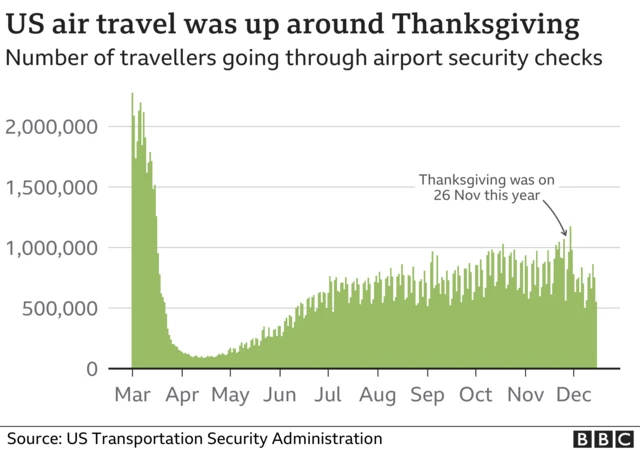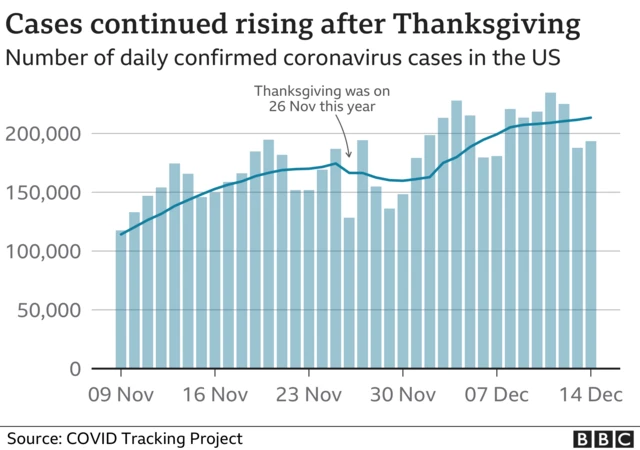Brexit Basics: Customs unionpublished at 17:08 GMT 23 December 2020
Confused by Brexit jargon? Reality Check unpacks the basics.
Read MoreConfused by Brexit jargon? Reality Check unpacks the basics.
Read MoreThe president says the result was "stolen" but his lawyers have so far had little success in court.
Read MoreFamily reunions over the holiday period brought people together, but did they spread coronavirus?
Read MoreWhat happens if there's a last-minute Brexit trade deal or they need to keep talking?
Read MoreWe examine widely shared false claims about vaccines - from "disappearing" needles to a "dead" nurse.
Read MoreClaims about the US president-elect are among misinformation being widely shared during an election.
Read MoreThe negotiating teams have been working "day and night" - what are the remaining issues still to be agreed?
Read MoreMilitant activity is spreading across northern Nigeria with other groups expressing allegiance to Boko Haram.
Read More Reality Check
Reality Check
There have been warnings in the UK that family reunions over the Christmas holiday period will lead to a spike in coronavirus infections.
The example of the Thanksgiving holiday last month in America has been pointed to, with claims that it led to a surge in infections.
In Parliament today, the shadow health secretary, Jonathan Ashworth said: “We saw in Canada and the US huge spikes in infections after Thanksgiving. We will see a spike here.”
But does the data support this assertion of “huge spikes” in the US?
The Thanksgiving holiday weekend was between Thursday 26 and Sunday 29 November.

Prior to Thanksgiving, infection rates were already increasing across the US and this upward trend has continued following Thanksgiving.
There were reporting delays around the holiday period (indicated by the flattening of the curve followed by a catch up period) but overall, cases in the two weeks following Thanksgiving rose by around 20% - about the same increase as in the two weeks prior to 26 November.

So there is no clear indication yet from the data that infection rates have accelerated following the Thanksgiving holiday. The rate of growth of infections has remained about the same as in the weeks before the holiday.
As for hospital admissions, the two weeks prior to Thanksgiving actually saw more people admitted to hospital with coronavirus, than the two weeks after – but you would expect any increase in hospital admissions to take longer to show up in the data.
It’s also too early to assess the impact on deaths as they can occur several weeks after infection. Experts say we may still be a week or so away from seeing the true impact – if any – of the Thanksgiving holiday.
The Covid Tracking Project, which monitors coronavirus statistics in the US, urged caution over drawing any conclusions from the recent data, saying: “Given the high rates of pre-holiday disease transmission, it'll be tricky to perfectly distinguish which events cause the spikes.”
By Ben Butcher
 Reality Check
Reality Check
At Prime Minister’s Questions, Labour leader Keir Starmer said that “In three out of four tier two areas, infections are going up. In over half of the tier three areas, infections are going up.”
When England exited its second national lockdown on December 2, 119 of the country’s 316 local authorities were placed into tier three areas.
Of these areas, rolling weekly case rates have increased in 61 of them (although the latest day the government has released these numbers for is December 10) – or just over a half.
And case rates are increasing in an even higher proportion of tier two areas – 159 out of 195 local authorities placed in tier two areas have cases growing.
So Mr Starmer is correct in both of his claims.
Case rates are increasing in a higher proportion of local authorities in the South of England than those in the North or Midlands.
Case rates show the proportion of the population who have tested positive for coronavirus in any given week. This can though be influenced by the amount of tests done in an area.
However, weekly admissions to hospital, which can be a metric of serious coronavirus cases, have also started increasing again.
 Reality Check
Reality Check
Labour leader Sir Keir Starmer asked the prime minister: "Why does he think that Britain, the sixth richest country in the world, with all our brilliant scientists and amazing NHS end the year with one of the highest numbers of Covid deaths in Europe?"
You can compare coronavirus figures from across the World in this piece from BBC News.
It shows the UK second in Europe behind Italy in the number of Covid deaths.
In deaths per 100,000 people, the UK comes ninth in Europe, behind countries such as Belgium, Italy and Spain.
Confused by Brexit jargon? Reality Check unpacks the basics.
Read MoreThe president of the United States is not chosen directly by voters, but by what's known as the electoral college.
Read MoreWhat will it mean if there is no deal between the UK and EU by the end of the year?
Read MoreIf the UK leaves the EU without a trade deal it will have to trade on WTO terms.
Read MoreWith no deal looking increasingly likely, how have both sides been getting ready?
Read MoreMisinformation is being shared about prominent politicians and the current protests in India.
Read MoreA Harvard icon and fake media have been used in a global campaign to serve Indian interests, research reveals.
Read MoreCompulsory mask-wearing has been highly controversial in the US.
Read More Reality Check
Reality Check
 Image source, Getty Images
Image source, Getty ImagesMany aspects of the UK and EU's future relationship remain uncertain.
But the one thing we do already know is some things will change from 1 January 2021.
So what are some of the most important things for people to think about?
And other issues that still remain unresolved?